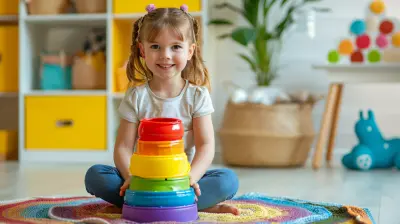How to Deal with Toddler Tantrums in a Compassionate Way
10 June 2025
Ah, toddler tantrums. Otherwise known as the Academy Awards of parenting. Screaming, flailing, a dramatic fall to the floor that would make even the most seasoned actor jealous—yes, you're living with a pint-sized drama king or queen, and they've just dropped the emotional equivalent of a nuclear meltdown because… you dared to peel their banana the "wrong" way.
Welcome to the chaos. But before you grab the nearest chocolate bar and lock yourself in the bathroom for some alone time, let's talk about how to handle these tantrums with compassion (yes, compassion—not sarcasm… okay, maybe a little sarcasm to survive).

What Exactly is a Toddler Tantrum?
In technical terms, a toddler tantrum is an emotional outburst marked by crying, yelling, stomping, and occasionally turning into a human spaghetti noodle right in the middle of Target. But really, it's just your toddler being overwhelmed. They're little emotional popcorn kernels, and tantrums? Well, that's them popping because they don’t yet know how to say, “I’m tired, hungry, overstimulated, and you’re not letting me eat dirt, and I’m mad about all of it!”Compassionate parenting doesn’t mean you let your toddler run wild while you chant affirmations in the corner. Nope. It means you meet the tantrums with empathy, boundaries, and maybe a little humor so you can all survive another day without needing therapy… yet.
Why Toddlers Tantrum (Spoiler Alert: It’s Not to Ruin Your Life)
We like to think our toddlers come with a built-in setting for embarrassment. Public meltdowns, impossible demands, and the occasional attempt to wrestle a dog toy away from an actual dog. But the truth is, tantrums are developmentally normal. Shocking, I know!1. They Can’t Regulate Emotions Yet
Think about the last time someone cut you off in traffic or your slow cooker betrayed you. Now imagine dealing with all that without words, impulse control, or a functioning frontal cortex. That’s your toddler—full of big feelings and zero ability to process them like a rational adult (or at least a semi-functioning one).2. Communication Breakdown
Toddlers have all these ideas, needs, and wants swirling in their tiny heads, but they can’t always express them clearly. Cue the frustration. It’s kind of like trying to navigate a foreign country without speaking the language and being expected not to cry about it. Yeah. That.3. Testing Boundaries (Because Why Not?)
They're also trying to figure out what the rules are. And no, they will not take your word for it. They’ll test every single limit, like a mini evil scientist conducting emotional experiments.
How to Handle Tantrums Without Losing Your Mind (or Screaming Into a Pillow)
Here comes the good stuff. You want to stay cool, compassionate, and in control even while your little one is channeling their inner banshee. Here’s how to do it (most of the time—we all have our "oops" moments).1. Stay Calm-ish
I know, I know. When your kid is on the floor shrieking because you gave them the red cup instead of the blue one, staying calm is basically Olympic-level parenting. But it matters.Your toddler feeds off your energy like a tiny sponge with emotional radar. You freak out = they freak out harder. Deep breaths, soft voice, and maybe a slight eye twitch (totally normal, I promise).
2. Validate Their Feelings (Even When They’re Ridiculous)
Yes, it's absurd that your toddler is sobbing over you not letting them lick the cat. But their feelings are real.Try saying things like:
- “You’re really upset right now.”
- “I see you’re having a hard time.”
- “It’s okay to be mad.”
You don’t have to agree with them. Just let them know you SEE them. Sometimes, that’s all they need.
3. Get Down to Their Level (Literally)
Towering over your toddler while they’re in meltdown mode is intimidating (even though you’re the one wearing the Paw Patrol shirt and haven’t had a shower in three days).Kneel down, make eye contact, and speak gently. This helps them feel safer. Also, it’s harder to yell when someone’s making eye contact and not towering like Godzilla.
4. Don’t Try to Lecture Mid-Tantrum
Trying to explain the laws of the universe or your household rules mid-scream fest? Yeah, that’s not gonna go well. It’s like trying to teach algebra to a cat. Wait until the storm passes.Let them get it out first. Comfort if they’ll let you. Sometimes they want a hug. Other times, they want to rage like a tiny Hulk. Respect the mood. Then talk later.
5. Offer Choices (But Not a Million)
Toddlers like to think they’re in control. So give them the illusion of power with simple choices:- “Do you want to wear the red shirt or the blue one?”
- “Do you want milk or water with lunch?”
But keep it to two options. Otherwise, you just trigger more chaos. Too many choices = decision fatigue = meltdown incoming.
The Aftermath: Teaching the Calm After the Storm
Once the tantrum is over and everyone’s breathing like relatively sane humans again, this is your real parenting moment.1. Debrief (Like a Toddler FBI Agent)
Once they’re calm, talk about what happened. Not a lecture—keep it simple.- “You were really upset when it was time to leave the park.”
- “It’s okay to feel mad, but it’s not okay to hit.”
This is how you teach emotional intelligence. One tantrum at a time.
2. Name the Emotion
Toddlers don’t come with an emotional vocabulary. You have to hand it to them.- “That was frustration.”
- “You felt disappointed.”
This gives them the tools to recognize their emotions next time—fingers crossed.
3. Praise Recovery, Not Just Behavior
Instead of only praising them when they don’t tantrum (which… might be never?), praise how they calm down:- “I’m so proud of how you took deep breaths.”
- “You did a great job using your words instead of yelling.”
Even if they only managed one coherent sentence between gulps of air and mascara-smeared sobbing (oh wait, that’s you), celebrate the win.
Compassion Doesn’t Mean Caving
Listen, showing compassion isn’t the same as giving in to every ridiculous demand. You're not raising a tiny dictator—you’re raising a future adult who knows how to feel things without throwing cutlery.Set boundaries. Stick to them. Be kind, not a pushover. It’s a balancing act worthy of Cirque du Soleil—but you’ve got this.
Examples:
- “I hear you want candy for breakfast. That’s not going to happen. I’ll make you a banana smoothie instead.”
- “You can be mad that it’s bedtime, but it’s still bedtime.”
Compassion = Empathy + Boundaries. Nailed it.
What If It’s Not Just a Phase?
Okay, deep breath: not all tantrums are typical. If your child’s meltdowns are extreme, last too long, or happen constantly, it might be worth talking to a pediatrician or specialist.Sensory issues, developmental delays, or anxiety can all make tantrums worse. You’re not failing. You’re just human, raising another tiny human with their own unique blueprint.
Real Talk: Surviving the Tantrum Years
Let’s be honest, the toddler years are like parenting boot camp. You’re under-slept, overstimulated, and constantly covered in crumbs. Tantrums are just the cherry on top of the hot mess sundae.But here’s the secret: Every meltdown is an opportunity (yes, we’re rolling our eyes together) to teach your child how to cope with life’s curveballs.
And when all else fails?
- Hide snacks in your closet.
- Text your bestie the latest tantrum horror story.
- Rewatch funny toddler memes for survival therapy.
You’re not alone in this. We’re all out here, ducking Lego landmines and trying to remember if we changed our shirts today. You are doing amazing—even on the days you don’t feel like it.
Final Thoughts (a.k.a. Pep Talk Time)
Toddler tantrums don’t last forever… even though they feel like forever. What does last is the way you show up for your kid, especially when they’re at their lowest and loudest.So the next time your toddler goes full volume over a broken cracker or the injustice of bedtime, take a deep breath, channel your inner zen master (or sarcastic commentator), and compassionately guide them through their storm.
You’ve got this. And if not, there’s always coffee. Or wine. Definitely both.
all images in this post were generated using AI tools
Category:
Emotional DevelopmentAuthor:

Maya Underwood
Discussion
rate this article
2 comments
Otis Griffin
Compassion is great, but remember: you’re not raising a tiny dictator! Set boundaries like a boss while sprinkling in kindness. It's about teaching, not just soothing. Because one day, they’ll be a teen, trust me!
June 12, 2025 at 3:18 PM

Maya Underwood
Absolutely! Balancing compassion with clear boundaries is essential for healthy development. Teaching life skills today will pay off during those teenage years!
Allison Mathews
Great tips! Remember, patience and empathy go a long way. You’re doing an amazing job navigating these challenging moments!
June 12, 2025 at 4:07 AM

Maya Underwood
Thank you! Your support means a lot, and I completely agree—patience and empathy are key!


